What are the major parts of a snowblower?
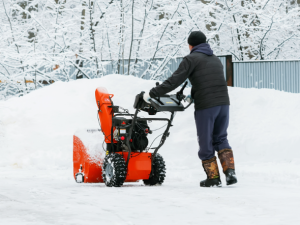

Snowblowers and snowthrowers experience a lot of wear and tear during a heavy snow season. Being familiar with the major parts of a snowblower (and their functions) can help you troubleshoot problems and keep your snowblower in top shape all winter long.
We’ve grouped the major parts of a snow blower into 4 categories: Auger Parts, Drive Parts, Engine Parts and Control Parts. Take a look at parts in the applicable section when you’re having problems with snowblower performance.
Auger Parts
Parts inside the auger housing pick up snow and through it out of the chute. These parts are often the first ones that wear out in your snowblower because they’re doing most of the work.
Auger and Shear Pins
The auger consists of rotating blades that collect snow and throw it out of the auger housing and through the chute. Some snowblowers use a set of auger segments attached to the auger shaft to pick up snow instead of using a single auger assembly with multiple blades.
Shear pins connect the auger or auger segments. If the auger blades hit a fixed object such as a rock or large chunk of ice, the shear pin will break and the auger (or an auger segment) will stop turning. The shear pin is made of soft metal that is designed to break and release the auger so the auger shaft doesn’t bind up and damage the engine or gear case.
When the auger system consists of a set of segments instead of one auger with multiple blade, a single segment can stop turning because its shear pin is broken while the other auger segments will keep spinning.
Replace any broken shear pins when the auger or an auger segment isn’t spinning after hitting a fixed object.
Replace the auger if it’s bent or damaged.
Auger Belt
The auger drive belt connects the engine pulley to the auger pulley to rotate the auger shaft and spin the auger. Its tension on the pulleys is controlled by the auger control lever, auger engagement cable and auger idler pulley. When you engage the auger control lever to spin the auger blades, the cable pulls the idler pulley against the auger belt to tension it against the auger pulley and spin the auger blades. When you release the auger control lever, the auger belt goes slack and doesn’t spin the auger pulley and blades.
Because the auger belt stretches over time, you’ll need to adjust the auger cable periodically to operate the auger controls properly. Follow the directions in the owner’s manual to adjust the auger engagement cable.
Replace the auger drive belt when it’s damaged or when it won’t spin the auger drive pulley even with the auger engagement cable adjusted properly. Our DIY YouTube video How to Replace a Snowblower Auger Belt shows how to install a new auger belt on common models of snowblowers.
Scraper Blade and Skid Shoes
The scraper blade is plate that runs along the bottom of the auger housing. It protects the auger housing and auger blades while it scrapes up snow the augers blades leave behind.
The scraper blade would quickly wear down to nothing if it constantly scraped directly against concrete or asphalt when clearing snow. That’s where the skid shoes come in.
Skid shoes attach to the side of the auger housing. The hard plastic skid shoes elevate the auger housing and scraper blade so they clear the ground, protecting them from wear and damage. The skid shoes slide along the ground so the snowblower moves smoothly.
These DIY YouTube videos show how to replace/adjust skid shoes and install a new scraper blade on common snowblowers:
Drive Parts
The drive parts control movement of the snowblower as you’re clearing snow. Here are the major drive components in common snowblowers.
Friction Disc and Wheel Plate
The friction disc--also called a friction wheel--is mounted on the drive wheel axle, at a right angle to the spinning drive wheel plate.
The drive wheel plate is a rotating metal plate in the drive system that shifts and rubs against the friction wheel when you engage the ground drive lever. The snowblower moves forward as the drive wheel plate spins the friction disc and ground drive axle.
The friction disc can eventually wear down. Replace the friction disc when it wears out and won’t spin the tires.
Motion Drive Belt
The motion drive belt connects to the ground drive pulley on the engine crankshaft and the drive wheel plate to spin the drive wheel plate as the engine runs.
Replace the motion drive belt if it’s worn or damaged and won’t spin the drive wheel plate properly.
Engine Parts
Snowblower engine parts wear out over time and need replacing. Here are the major engine parts that you’ll eventually need to replace in your snowblower.
Spark Plug
The spark plug is a removable component in the combustion chamber that contains the spark electrode to ignite the fuel mixture and drive the piston. Replace the spark plug when it gets fouled and won’t spark.
Carburetor
The carburetor mixes air with fuel in the proper proportion to produce a combustible gas. That gas/air mixture then moves into the cylinder where the piston compresses it and the spark plug ignites it. Replace the carburetor when it gets clogged or damaged and won’t mix fuel and air properly. In some situations, you can rebuild the carburetor using a carburetor rebuild kit as shown in our Rebuilding a Carburetor on a Snowblower DIY YouTube video.
Engine Starter
Snowblowers typically have either an electric starter or a recoil starter. The starter spins the crankshaft to start the engine.
The electric starter attaches to the engine crankshaft and includes a cord that plugs into an electrical outlet to provide the starter motor with power. You plug the electric starter into an electrical outlet and push the button on the starter motor to spin the crankshaft and start the engine. Replace the electric starter if it won’t spin the engine when you press the start button.
The recoil starter is a starter system mounted on the engine that consists of a rope and spring-loaded pulley system. The person operating the snowblower pulls the starter rope, which rotates the spring-loaded pulley and spins the crankshaft to start the engine. Replace the recoil starter if it binds up or breaks.
Stop Switch or Ignition Switch
The engine stop switch—also called the ignition switch--prevents the engine from starting unless you insert the key. The spark plug doesn’t get electric current when you remove the key. Replace the engine stop switch if it prevents the spark plug from getting electrical current with its key inserted.
Fuel Filter
The fuel filter attaches to bottom of the fuel tank and connects to the fuel line. It filters particles from the gasoline as fuel moves from the tank to the carburetor.
Keep your snowblower engine running smoothly by tuning it in the fall. Our Snowblower Tune-Up video shows you how.
Control Parts
The control parts govern auger spinning and ground movement of the snowblower. Levers and cables let you control the snowblower when clearing snow. Replace these control parts when they are worn or damaged:
Auger Engagement Cable
The auger engagement cable is a control device that connects the auger control lever on the control panel to the idler pulley engagement lever in the auger drive system. Our Replacing an Auger Engagement Cable on a Snowblower DIY YouTube video shows you how to replace that part.
Ground Drive Cable
The ground drive cable connects the motion actuator lever on the control panel to the bracket on the drive wheel. It moves the drive wheel to engage the friction disc that rotates the tires.
Chute deflector cable
The chute deflector cable raises and lowers the deflector as you move the control lever to direct snow blowing from the chute.
Chute control gearbox
The chute control gearbox moves the discharge chute left or right and is controlled by the joystick on the control panel. The joystick rotates the chute rod, which drives the gears in the chute control gearbox to move the discharge chute.
Keep your snowblower in top shape by having a Sears Technician professionally maintain your snowblower yearly. Your snowblower won’t just work better, it will also last longer when you keep it in top shape.
Symptoms for gas snowblowers
Choose a symptom to see related snowblower repairs.
Things to do: replace the spark plug, change the oil, rebuild the carburetor, adjust valve lash, adjust or replace the b...
Main causes: clogged chute, damaged auger blades, broken shear pins, worn auger belt, damaged gear case, engine problems...
Main causes: dirty carburetor, stale fuel...
Main causes: punctured tire, damaged rim...
Main causes: dirty carburetor, clogged fuel filter, dirty spark plug, incorrect valve lash, leaky engine gaskets...
Main causes: stale gas, clogged carburetor, clogged or broken fuel line, dirty spark plug, bad rewind starter, incorrect...
Main causes: loose drive clutch cable, damaged drive clutch cable, worn friction disc, scraper blade scraping the ground...
Main causes: snow build-up in chute, chute drive mechanism failure, bad chute control assembly...
Main causes: clogged chute, snow build-up in auger housing, broken auger shear pins, auger drive belt needs adjustment, ...
Repair guides for gas snowblowers
These step-by-step repair guides will help you safely fix what’s broken on your snowblower.
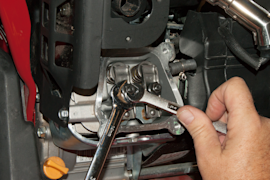
How to adjust snowblower engine valve lash
Adjust the engine valve lash on your snowblower to keep the engine starting and running smoothly....

How to adjust snowblower skid shoes
To prevent snowblower auger and shave plate damage, adjust the skid shoes regularly to keep the shave plate ¼-inch high....
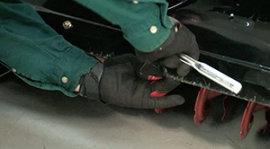
How to replace a snowblower shave plate
Follow the 7 easy steps in this repair guide/video to replace a worn out shave plate on your snowblower....
Articles and videos for gas snowblowers
Use the advice and tips in these articles and videos to get the most out of your snowblower.
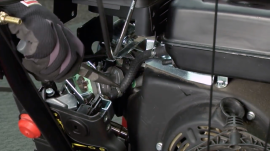
Get an overview of the main steps in a snowblower tune-up and click to videos with more details....
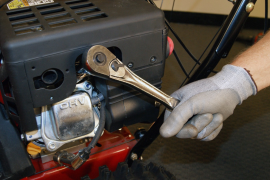
Get your snowblower ready for winter before winter arrives, so you don't have to mess with it while snow piles up....
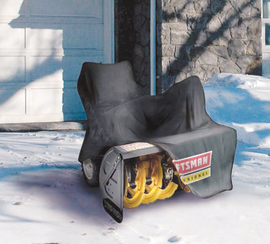
Protect your snowblower's engine and body by preparing it for after-season storage....